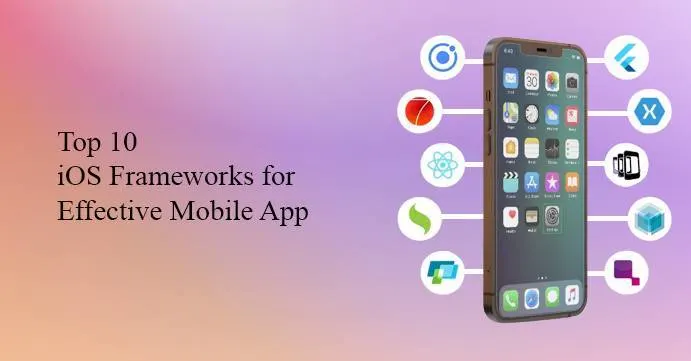Top 10 iOS Frameworks for Building Advanced Applications

Introduction
Every day, new applications keep on adding in the Apple App Store in line with the increasing popularity of iPhones. As more people spend higher time on iPhones, it is interesting to go through the top 10 iOS frameworks that facilitate feature-rich app development.
iOS developers have benefited from various options when it comes to app development frameworks. Robust development frameworks can make development and maintenance of apps easier.
However, it is impossible to select the best framework, as every developer has unique requirements and choices. Moreover, the selection of development language and framework is highly subjective. Despite having a wide range of options with iOS developers , developers need to consider the functioning of these platforms and utilization of tools from Apple’s perspectives.
Here we mention the top ten iOS app development frameworks that will help developers choose the most suitable one as per their project needs.
Top 10 iOS Frameworks
1. SwiftUI
With the emergence of SwiftUI, every single developer has been examining its usefulness for app development. The framework has brought an acceleration in development, which is exciting for developers. Moreover, it is accessible across the entire Apple setting, which means that developers can build apps for multiple platforms at the same time.
Apart from this, SwiftUI allows your app to match other various mobile app development framework settings out of the box regardless of the framework’s presence.
2. React Native
Facebook created React Native for mobile app development. It is one of the best cross-platform app development frameworks. Currently, it tops the list of JavaScript frameworks. It is one of the easiest ones to learn and adapt.
For various companies, React Native has become one of the go-to mobile app development frameworks due to its cross-platform functionality. It truly fits the line, “adapt once, build anything.”
3. Flutter
Flutter offers cross-platform functionality for effective mobile and web app development. With its unique code, you can efficiently build Android and iOS applications at the same time. Created by Google, Flutter offers Skia, a 2D delivering motor that aids in building visuals of the application.
4. Kotlin Multiplatform
JetBrains developed Kotlin Multiplatform that acts as an SDK for cross-platform mobile development. It utilizes the multiplatform functionality of Kotlin. It offers various tools and features to enhance the end experience of developing cross-platform mobile apps with much efficiency.
Frequently, iOS and Android versions of an app can have many things in common. However, they also differ remarkably in terms of their UI. Apart from this, an app’s data management, business logic, authentication, and analytics can also be alike. Kotlin allows you to have this flexibility and also reap the benefits of native programming. It allows you to use a single codebase for the business logic of both iOS and Android apps and has separate platform-specific code where needed.
5.Ionic
With simple architecture, Ionic offers to build cross-platform applications for all devices with code reusability of around 98 percent. It offers a modified API library and native mobile toolkit that can be distributed anywhere. Developers who are well-versed in Angular can easily adapt to using Ionic.
6.Xamarin
Xamarin had gained momentum in the world of frameworks because of its single shared codebase and effectively integrated apps. The popular and most loved C# language efficiently supports the framework. Additionally, it enhances the quality of the app and supports numerous tools of Xamarin.
Xamarin is popular among developers, as it enables them to build native apps for Mac OS, iOS, and Android devices. One of the biggest benefits is that it assures fewer bugs, which is like “icing on the cake” for developers. Apart from this, it also reduces time consumption with the feature of code reusability and matching syntaxes.
7. Intel XDK
Everyone in the tech world very well knows the name of Intel. Intel XDK permits developers to build cross-platform apps for every app store available. Thus, you can reach a wide range of audiences through an application. Additionally, it consists of plugins and web services for various responsive applications, interactive mobile apps, rich content. Intel XDK is known for its support to developers in every task such as testing, debugging, and emulation.
8. Sencha Touch
Sencha Touch offers cross-platform app development with JavaScript and HTML 5. It is known as a responsive enterprise-oriented development framework. It is one of the finest choices of developers in the world of mobile app development frameworks.
It allows building robust apps that provide near Native app experience. Moreover, it offers drag-and-drop features with HTML 5 application builder and ready-to-use mobile app templates. Apart from this, developers can add customized components to their virtual library for reuse.
9. Alamofire
Alamofire is a framework written in Swift. It is popularly used for iOS app development. The framework is known to be AFNetworking’ If you intend to develop a Swift project, Alamofire can be the best choice because it ensures that your core networking library is dependable with your source code.
10. Native Scripts
When you plan to develop a cross-platform application for both iOS and Android, then Native script happens to be your choice. It is an open-source framework, which is used to build native apps. These apps have access to sections of a user’s phone such as cameras, GPS, contacts, and more. Above all, cross-platform app development has gained momentum because of its flexibility and comfort of development.
Wrapping Up
The era of smart technology has brought the emergence of a wide array of applications. Today, you get apps for almost everything and can accomplish your task with just one click from the comfort of your couch. However, it has increased developers’ task of selecting the right fit for mobile app development.
We live in a competitive era; wherein mobile app development companies strive to come up with new and robust applications to enhance their user experience. Moreover, they continuously need to keep themselves updated in every aspect to be on top. A framework plays a vital role in building robust, faster, efficient, engaging, and high-functioning applications.
If you own a business, it is high time that you must integrate applications into your trade. High-performing mobile apps will help you take your business to new heights of success. In this case, you can hire cross-platform development services . In this blog, we have tried to resolve the complexities of the selection of the right framework by mentioning the top 10 iOS frameworks.





 Have an Idea?Let’s Build It Together!
Have an Idea?Let’s Build It Together!

